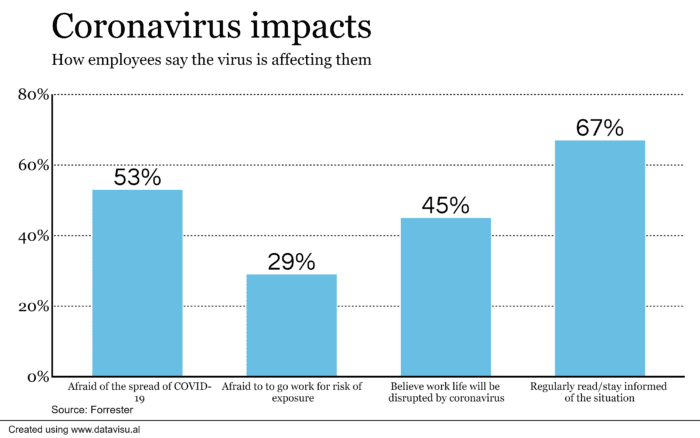If the future has ever been uncertain, now is that time in global history, thanks to the COVID-19 pandemic. The pandemic has also brought about unprecedented changes around the world, causing people to adjust to new ways of living, thinking, working, and doing things. The adjustments that people must make are numerous and far-reaching, cutting across physical dimensions into mental and psychological terrains as well. Some believe that the extent of the behavioural modifications by people cannot be accurately documented until the wave of the disease is over, or at least significantly contained. A study by Forrester on how employees globally are impacted by the virus conducted shows that 67% of employees are committed to reading regularly and staying informed of the situation.
Due to the impact of COVID-19 on economies and commerce globally, business owners have to make hard decisions to ensure their businesses survive the period. For most companies, the priority now is survival rather than profit.
“The crisis has forced many organisations previously unwilling to formally accept working from home as normal business practice, to retrace their steps” ( Ivana Osagie, businessday.ng 4th June 2020). The work from home phenomenon has implications; implications on how performance is going to be measured across organisations.
The CEO of Operations Inc., David Lewis, is an experienced Work-From-Home employee who, incidentally, has been overseeing remote-workers for 19 years and according to him “we are in a brand-new, uncharted territory…most employees aren’t used to working remotely. Plus, they’re working in less-than-ideal conditions”. And when we examine his words from the viewpoint of an employee who has never worked remotely before, home can quickly become a maze. It also becomes critical to be able to ensure that work is done in a way that performance can be accurately measured. Employees are under a lot of stress beyond work in this new normal, and this is a factor that must be considered in planning towards performance management especially in the areas listed below:
- Setting goals, objectives, and tasks
- Collaborative communication (using all possible and acceptable mediums)
- Technology-based PM: Use of performance management software
- Giving frequent constructive feedback
- Rewards and bonus
Business goals and KPIs must be clearly stated and understood by all concerned. There must be more frequent communication such that understanding and confidence is built amongst team members and managers, using all available mediums of technology-driven communication such as meetings, e-hangouts, and videoconferencing.
Furthermore, any performance management system/software used must be agile, with the ability to accommodate remote working. The decision on how to manage performance within the new normal is now a vital one, as deliverables have become more valuable. Businesses need to survive, and their survival is hinged on their people performing optimally. This is the time to decide whether to continue using the same performance management system or to change it. If the current system is well-established and achieves the desired result for the organisation, then customising to fit remote working scenario might become necessary, if not already embedded.
From our over 27 years of experience in consulting and guiding our numerous clients in various sectors globally, performance management under remote working conditions must be closely tied to deliverables as opposed to availability. As a precursor to results, regular feedback must be systemised between employees and their line managers. This transition became the practice among organisations like General Electric (GE) pre-COVID-19, and the results are obvious. According to a September 2011 Joblist study of 1,032 full-time employees, nearly 60% of these employees believed that getting feedback regularly was very motivating.
Rewards and Recognition (R&R) must be well thought out as an incentive for motivating performance. Other forms of intrinsic rewards systems should be explored as a viable way of motivating performance, as the reality of the business environment is majorly averse to increasing employee salaries.
As a follow on from the refocusing of organisation strategies owing to the COVID-19 pandemic, it is important to ask:
- Are the performance goals pre-COVID-19 still relevant?
- Are our business goals still the same or they have changed?
While these are questions that may be necessary, the underlying idea is that these are uncertain times and all stakeholders are in dire need of connection, clarity on what is needed and what must be done to achieve business goals.
In this “new normal”, there should be a lot of engagement and empathy displayed as businesses try to keep afloat and flourish. The process of defining the appropriate performance management practices may be daunting for organisations as they grapple with survival, business continuity efforts and at the same time are trying to ensure they keep motivating optimum performance of their people.
If you are uncertain about how to navigate and tease out optimum performance from your people, we are skilled to help. Kindly contact people@phillipsconsulting.net. We would be glad to be your trusted advisor.
Written by:
 |
 |
| Esther Amoye
Senior Consultant |
Joshua Ademuwagun
Managing Consultant |

